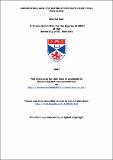Adenovirus and its interaction with host cell proteins
Abstract
The E1B55k gene in adenovirus type 5 was studied by generating recombinant viruses in which the E1B55k gene was N-terminally tagged with either a cyan fluorescent protein (CFP) tag or a tandem affinity purification (TAP) tag. By infecting cells with the recombinant adenovirus expressing CFP tagged E1B55k, localisation of the E1B55k protein during infection could be studied. Generation of the recombinant viruses expressing TAP tagged E1B55k would allow purification of the E1B55k protein and any cellular or viral proteins that interacted with E1B55k. By infecting different cell types and harvesting at set time points during infection, the proteins interacting with E1B55k at different time points during infection could be identified. The E1B55k protein is modified by small ubiquitin modifying protein 1 (SUMO-1) at lysine residue 104 within the SUMO consensus sequence, and sumoylation can be abolished by mutating the lysine residue to an arginine (Endter et al, 2001). Therefore in order to study the effect of SUMOylation of E1B55k, on adenovirus infection, CFP and TAP tagged recombinant viruses in which the E1B55k protein was mutated to contain an unmodificable arginine at postion 104 were also generated.
Stable cell lines expressing TAP tagged wild type E1B55k, and E1B55k in which lysine residue 104 had been mutated to an arginine were also generated as an alternative method to study the interacting proteins of E1B55k.
Four different isoforms of SUMO have been identified, named SUMO1-4. Stable cell lines expressing SUMO-2 were infected with wild type adenovirus type 5 and harvested at set time points in order to determine if any adenoviral proteins were modified by SUMO-2.
Type
Thesis, MPhil Master of Philosophy
Collections
Items in the St Andrews Research Repository are protected by copyright, with all rights reserved, unless otherwise indicated.

